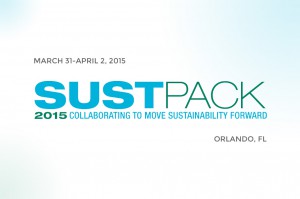The keynote speakers for day one of SustPack 2015 provided a kick-start to this conference dedicated to issues relevant to sustainable packaging. All three speakers presented evidence suggesting that industry as a whole (not just the packaging value chain) is struggling to adapt to a diversity of “stimuli” — a shrinking resource base with increasing costs for raw materials, changing expectations of customers, investors and society’s notion of what is required to be a good corporate citizen, and hopefully, a sense of personal responsibility to be effective agents of change, helping their companies to adapt and thrive in what several of the speakers referred to as a “highly dynamic marketplace.”
 David Kiron, a professor from MIT and co-author of a series of publications has conducted extensive research to understand the differences between “walkers,” companies that demonstrate a clear commitment, backed up by evidence that they are on a path to becoming more sustainable enterprises and the “talkers,” companies that acknowledge the importance of sustainability but are struggling to understand how to use sustainability as a compass to guide their strategies for survival if not future growth. In short, how to adapt their business models to a shifting landscape with new realities.
David Kiron, a professor from MIT and co-author of a series of publications has conducted extensive research to understand the differences between “walkers,” companies that demonstrate a clear commitment, backed up by evidence that they are on a path to becoming more sustainable enterprises and the “talkers,” companies that acknowledge the importance of sustainability but are struggling to understand how to use sustainability as a compass to guide their strategies for survival if not future growth. In short, how to adapt their business models to a shifting landscape with new realities.
I was struck by a couple of thoughts while listening to David’s research. As someone who works for a non-profit organization attempting to inform and build the capacity of businesses to implement more sustainable practices, I welcome any insights into how we might help companies “walk the talk.” It’s almost a reflexive response of American business culture to want to be seen as “decisive,” “proactive,” “leading” and “visionary.” We need more companies to lead by example, to demonstrate what is possible so that others may follow – quickly. As sustainability professionals, we get frustrated by the seemingly inexhaustible energy to want to talk, gather more data, dispute the data, gather different data in order to debate whether one can truly make a “business case for sustainability.” But this is all a part of the process of learning how to evolve, to adapt. “Talkers” play a critical role in the process of evolution. Their role is to build awareness in their companies and industry sectors, to amplify the signal, creating positive reinforcement for companies when they decide to take the leap of leadership.
Tamara Bekefi from Daedalus Strategic Advising provided a compelling rationale for why companies should continue talking if not walking. Apparently, it’s not only the Socially Responsible Investment (SRIs) firms that have their ear to the ground. The number of investors looking for evidence of corporations that are using sustainability as a means of forecasting and mitigating risk to their business is increasing. Investors clearly see the correlation between the metrics that are used to define sustainable business practices and the more traditional ones that companies currently hold as important and attempt to measure their performance against: risk management, innovation, reputation (license to operate + ability to attract talent), stakeholder demand, competition, staying ahead of regulations, etc.
In response, companies are beginning to integrate sustainability reporting into their annual reports as opposed to treating them as supplemental to their business operations. It will be interesting to see if the investment community also steps up to the plate and realizes it will be difficult for companies to make the necessary long-term investments that more sustainable solutions require and still meet Wall Street’s expectations for short-term revenue growth. Similar to the “slow food movement,” the “slow money” movement needs Wall Street to adjust its financial metrics to recognize and reward companies who are building wealth more slowly (i.e., sustainably) by planning for future, long-term growth. Maybe Wall Street can judge such investments by utilizing a “sustainability ROI” as opposed to the typical ROI of 2-3 years.
The final speaker of the session was Bill Frerking from Georgia Pacific. Bill reminded the audience that much of sustainability is relative and depends on a variety of things: the type of business your company is in, where the company sits in the value chain, who your customers are, who your influential stakeholders are, as well as the culture of the company. One of the basic challenges of operating a business, let alone one aspiring to be more sustainable is the ability to manage different interests of stakeholders when they often have conflicting demands. Bill noted that just as one cannot approach packaging as a monolithic problem or opportunity, sustainability is not a “one size fits all” solution. All companies should realize that the pursuit of sustainability is about resolving conflicting demands (“trade-offs”) in a manner that makes sense to the unique attributes of your business.
One assertion that Bill made in his presentation that I did not agree with was the idea that “market demand” (i.e., consumers) could send clear signals for their preferences to purchase more sustainable products. A common refrain that one hears from companies about why they are not doing more to address sustainable production is that their customers “are not asking for it.” The market can be an efficient mechanism for governing the supply and demand of resources used for production but not necessarily as a rationale for using those resources more sustainably. Thus far, the sustainability movement is still in the process of educating the manufacturing community about why sustainable production and consumption is critical to the future security of their businesses. The idea that the average consumer has the education, information, and context necessary to make an informed purchasing decision to send a clear signal of demand or preference is either naive or disingenuous, and counterproductive to the work that must be done. Companies who have the foresight, talent, and ambition to lead by example will not be those whose approach is to “let the market decide.”
Categories
SUSTPACK 2015 — Adaptation and Resiliency


